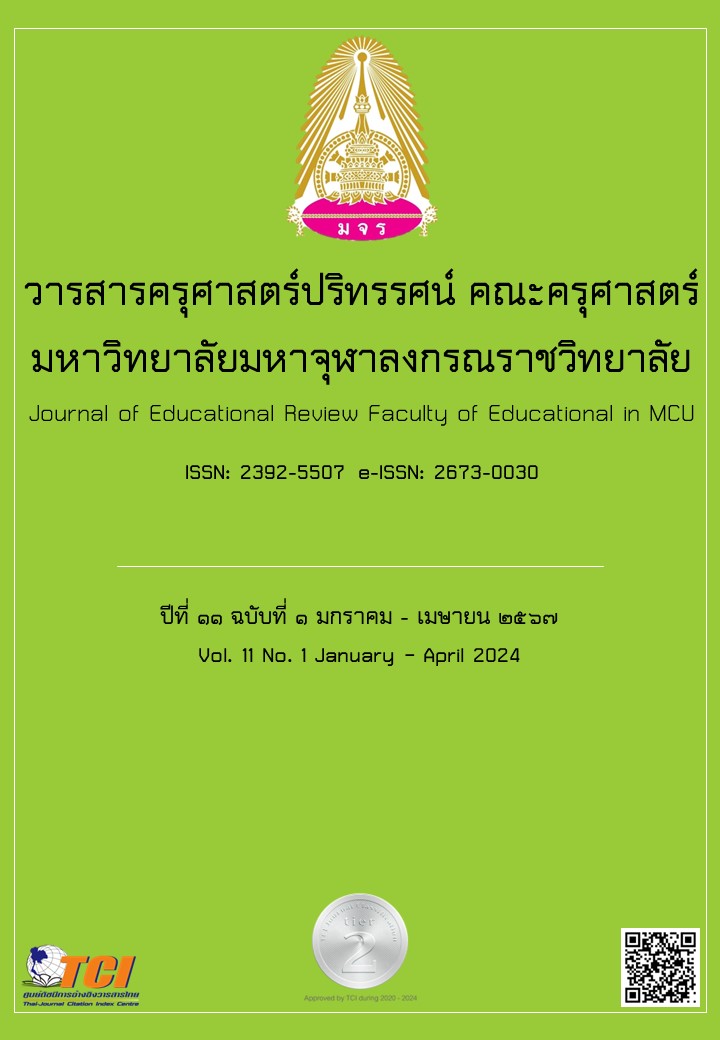A PARTICIPATIVE ADMINISTRATION OF COMMUNITY-BASED SCHOOL LEARNING RESOURCES MANAGEMENT TO SUPPORT LEARNING SKILLS FOR LEARNER IN THE 21st CENTURY UNDER THE OFFICE OF PATHUMTHANI SECONDARY EDUCATIONAL SERVICE AREA
Main Article Content
Abstract
The purpose of this research article was to study a participative administration of community-based school learning resources management to support learning skills for learner in the 21st century under the office of Pathumthani Secondary Educational Service Area. It was a combined method research. The research method had 3 steps: Step 1: Study the conditions and guidelines for a participative administration of community-based school learning resources management to support learning skills for learner in the 21st century, with the population using in the research, there were 22 people and 12 key informants in the interviews. Step 2: To develop and test a community participatory management model for managing learning resources in schools to enhance learning skills of learners in the 21st century by in-depth inquiry with 9 experts, obtained through purposive selection, and step 3 to evaluate the model by examining the feasibility and usefulness of the model with the research population of 22 people, quantitative data were analyzed using basic statistics, namely percentage, mean, and standard deviation and qualitative data were analyzed using content analysis. The results found that; the community participatory management model for managing learning resources in schools to enhance the learning skills of students in the 21st century under the Pathum Thani Secondary Educational Service Area Office consisted of 2 components: Component 1: Management; there were 5 areas of participation: 1) planning, 2) performing various actions, 3) evaluating results, 4) providing resources, 5) disseminating knowledge. Component 2: PDCA management model, 4 steps, including 1) plan work operations (P: Plan), 2) carry out the plan (D: Do), 3) check and evaluate results (C: Check), 4) bring the evaluating results to improve work (A: Act). The results of evaluating the feasibility and usefulness of the model in overall, it was at the highest level.
Article Details

This work is licensed under a Creative Commons Attribution-NonCommercial-NoDerivatives 4.0 International License.
ทัศนะและความคิดเห็นที่ปรากฏในบทความในวารสารฉบับนี้ถือเป็นความรับผิดชอบของผู้เขียนบทความนั้นเพียงผู้เดียว และไม่ถือเป็นทัศนะและความรับผิดชอบของกองบรรณาธิการ
กองบรรณาธิการขอสงวนสิทธิ์ในการคัดเลือกบทความลงตีพิมพ์และจะแจ้งให้เจ้าของบทความทราบหลังจากผู้ประเมินบทความตรวจอ่านบทความแล้ว
ต้นฉบับที่ได้รับการตีพิมพ์ในวารสารครุศาสตร์ปริทรรศน์ คณะครุศาสตร์ มหาวิทยาลัยมหาจุฬาลงกรณราชวิทยาลัย ถือเป็นกรรมสิทธิ์ของคณะครุศาสตร์ มหาวิทยาลัยมหาจุฬาลงกรณราชวิทยาลัย ห้ามนำข้อความทั้งหมดหรือบางส่วนไปพิมพ์ซ้ำ เว้นเสียแต่ว่าจะได้รับอนุญาตจากมหาวิทยาลัยฯ เป็นลายลักษณ์อักษร
References
กระทรวงศึกษาธิการ. (2545). พระราชบัญญัติการศึกษาแห่งชาติ พุทธศักราช 2542 แก้ไขเพิ่มเติม(ฉบับที่ 2) พุทธศักราช 2545. กรุงเทพมหานคร: โรงพิมพ์คุรุสภาลาดพร้าว.
บุปผา ทองน้อย. (2557). การพัฒนารูปแบบการบริหารจัดการสู่งานประกันคุณภาพการศึกษาภายในที่มีประสิทธิภาพของโรงเรียนสังกัดสำนักงานเขตพื้นที่การศึกษามัธยมศึกษา เขต 39. ดุษฎีนิพนธ์ปรัชญาดุษฎีบัณฑิต. มหาวิทยาลัยนอร์ทกรุงเทพ.
ปรีดา บุญเพลิง, เสาวณีย์ สิกขาบัณฑิต และสิริกาญจน์ ธนวุฒิพรพินิต. (2562). การนำรูปแบบการบริหารโรงเรียนนิติบุคคลไปสู่การปฏิบัติระดับการศึกษาขั้นพื้นฐาน ในภาคตะวันออกเฉียงเหนือ. วารสารวิชาการ มหาวิทยาลัยนอร์ท กรุงเทพ. 8(1). 96-106.
สำนักงานเขตพื้นที่การศึกษามัธยมศึกษาปทุมธานี. (2563). แผนปฏิบัติการประจำปีงบประมาณ พ.ศ. 2563. ปทุมธานี: สำนักงานเขตพื้นที่การศึกษามัธยมศึกษาปทุมธานี.
สำนักงานเลขาธิการสภาการศึกษา. (2553). ข้อเสนอการปฏิรูปการศึกษาในทศวรรษที่สอง (พ.ศ. 2552 - 2561). กรุงเทพมหานคร: พริกหวานกราฟฟิค.
สำนักงานเลขาธิการสภาการศึกษา. (2560). แผนการศึกษาชาติ พ.ศ. 2560 - 2579. กรุงเทพมหานคร: พริกหวานกราฟฟิค.
สิริกาญจน์ ธนวุฒิพรพินิต และคณะ. (2563). หลักสูตรฝึกอบรมการประกันคุณภาพการศึกษาภายนอก ระดับการศึกษาขั้นพื้นฐาน. วารสารครุศาสตร์ปริทรรศน์ คณะครุศาสตร์ มหาวิทยาลัยมหาจุฬาลงกรณราชวิทยาลัย. 7(1). 121-132.
Fetterman, D.M. (1996). Empowerment Evaluation: An Introduction to Theory and Practice. In Fetterman, D.M., Kaftarian, S.J., Wandersman, A. (Eds). Empowerment Evaluation: Knowledge and Tools for Self – assesment and Accountability. Thousand Oaks, CA: Sage.
Kusek, J.Z. & Rist, R.C. (2004). Ten Steps to a Results – based Monitoring and Evaluation System: A Handbook for Development Practitioners. Washington, D.C.: The International Bank for Reconstruction and Development/ The World Bank.
Stufflebeam, D. L. & Shinkfield, A. J. (2007). Evaluation Theory, Models and Applications. CA: John Wiley and Son, Inc.


